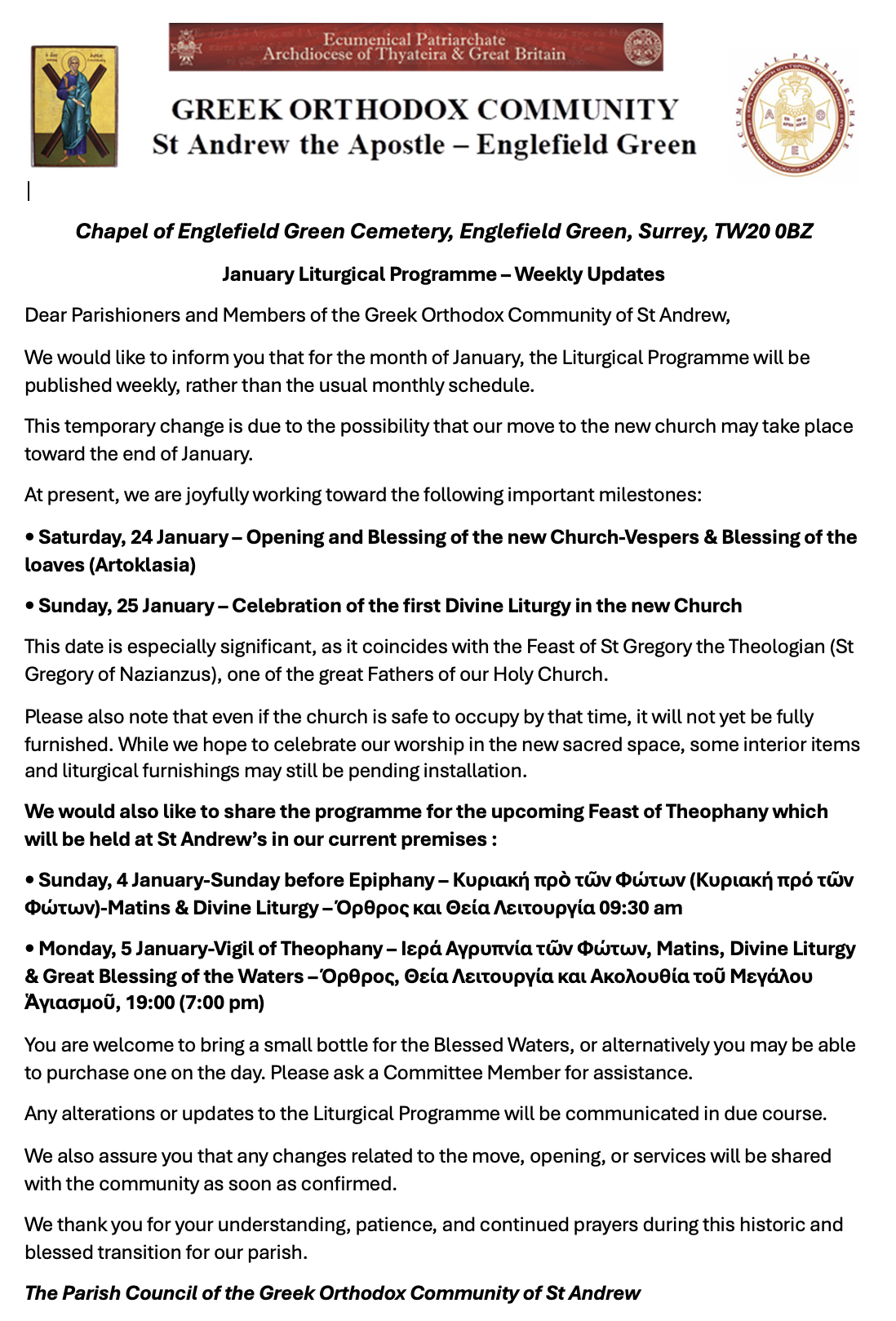Liturgical Programme
What time should I arrive?
Matins (Morning Prayer) begin at 09,30 am. The Divine Liturgy commences soon after and ends around 12,00 PM.
When evening services are scheduled, these begin at 18,30 during winter and at 19,00 during summer.
Should a special feast celebration be scheduled, the relevant time will be announced accordingly.
You can simply push open the door and enter.
What is a Greek Orthodox Service Like?
Come, let us Worship and bow down before our King and God.
Come, let us worship and bow down before Christ, our King and God.
Come, let us worship and bow down to Christ Himself, our King and God.
This is the invitation which marks the beginning of each day for the Orthodox Church. It comes from the office of Vespers and it expresses the attitude which is at the heart of Orthodoxy. The Worship of the Holy Trinity: God - the Father, Son, and Holy Spirit, and which is fundamental to the life and spirit of the Orthodox Church.
Worship is at the centre of Orthodoxy as it is the real manifestation of God's presence and action in the midst of His people. It is God who gathers His scattered people together, and it is He who reveals Himself as we enter His presence. If you are not Orthodox the best introduction to the Orthodox Church is to attend the Divine Liturgy or the celebration of one of the major Sacraments. At first, as a visitor you may be overwhelmed by the music and the ceremonies, but it is in Worship that the distinctive flavour, rich traditions, and living faith of Orthodoxy are truly experienced.
On entering our church, you will notice that throughout the temple is decorated with icons depicting our Lord Jesus Christ, the Holy Theotokos and Saints from the past but also from more recent times. These icons are the source of knowledge and inspiration as they connect the faithful to the Holy, but they also remind us of how humanity has devoted in service to God.
In the Orthodox Church, we truly believe in the communion of saints, vividly affirming this glorious truth as each icon carries a compelling narrative of the life of the saint. It is customary, when entering the church to light a candle, make an offer and venerate the Holy icons.
The Holy services are mostly chanted (with the exclusion of some psalms which are usually read) and alternated between Greek and in English. On some days (these are specifically scheduled), only English is utilised for the celebration of the Divine Liturgy.
During the celebration of the Divine Services, you will notice that the celebrants will make prostrations, read special prayers and at times escorted by their assistants will exit from behind the iconostasis (the panels at the front, on either side of the archway adorned with icons which separates the Holy altar from the rest of the church) and walk in a procession while holding either the Gospel or the Holy Gifts for the Eucharist.
Whenever the celebrants are in the nave with the congregation, during the reading of the Holy Scriptures, when the celebrants incense or bless as well as during the consecration of the Holy gifts, everyone who can physically stand will do so, and as a visitor, you may wish to follow suit.
It is also customary to always kiss the right hand of the clergy to ask for their blessing. This is also true when you are handed something such the antidoron (blessed bread distributed at the end of the Divine Liturgy. This is not the Holy Communion) or anything else.
You will also notice that clergy and faithful often make the sign of the cross. Feel free to engage in these actions if they enhance your sense of being part of the worshipping community. Alternatively, you can simply immerse yourself in the spiritual experience. Please remember that you are entering a Holy place and as such we kindly ask that you dress respectfully, silence your mobile devices, refrain from chewing gum and talking as this can disturb prayer and cause distraction to the rest of the faithful.
Always enter God’s House formally with reverence and respect.
Can I receive Holy Communion?
The pinnacle of the Divine Liturgy is the moment when Orthodox believers partake in Communion, receiving the Body and Blood of Christ. This sacred act is exclusively open to baptized Christians who have been confirmed in the Orthodox Faith and have adequately prepared themselves with fasting.
If you are not able to partake in the Holy mystery or if you are not an Orthodox Christian, you may receive the antidoron as a gesture of Christian fellowship and love and this being the remains of the prosphoro blessed during the course of the Divine Liturgy.

